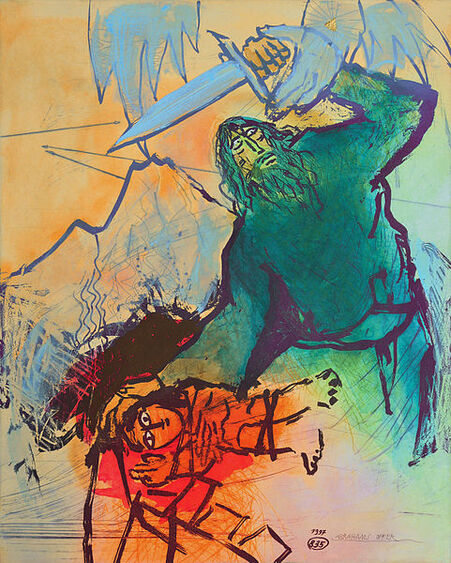|
By the Reverend Sally Weaver
After God blesses Abraham for his obedience, Abraham returns to the 2 young men he had left with his donkey. But there’s no mention of Isaac returning with Abraham. Abraham left the mountain with the 2 young men but Isaac is not said to be with them. There is no record of Abraham and Isaac ever talking together after the near sacrifice on the mountain. The Bible tells us that Abraham arranged for Isaac to be married. But that was done through Abraham’s steward, not through a conversation between Abraham and his son. When Isaac marries Rebekah, they move into his dead mother Sarah’s tent, not his father’s tent. The next time we hear of Isaac and Abraham together, Isaac is burying Abraham with his half-brother Ishmael by his side. There is no mention in the Biblical text of Abraham ever giving Isaac his blessing before his death. And what of Isaac? Except for a brief tale about Isaac and Rebekah among the Philistines that is an exact copy of the story of Abraham and Sarah among the Egyptians, Isaac doesn’t speak after the incident on Moriah until he is near death. For all intents and purposes Isaac is silent from the point at which he’s lying on the altar about to be sacrificed to the point at which he’s lying on his deathbed, blind and feeble. Isaac is the most silent and least visible of the patriarchs. And twice in the Hebrew Scriptures God is referred to as “the God of Abraham and the Fear of Isaac.” Is it any wonder? If my father had tried to kill me because God told him to, I too would think of God as the Fearsome One. One proposed purpose of this story is that it makes clear that God does not require human sacrifice. The argument is that human sacrifice was part of ancient culture. So by making it plain that human sacrifice is not necessary, YHWH differentiates himself from other gods. That sounds good. The problem is that although there’s lots of evidence of human sacrifice in ancient civilizations on this continent, particularly in South America, there’s little evidence of it in the ancient Near East. And even if we accept this as the purpose of the story, it doesn’t make sense of God’s initial command to Abraham to sacrifice Isaac. If human sacrifice were the cultural norm, why don’t we have a story in which Abraham sets about to sacrifice Isaac and God stops him, rather than a story in which God commands Abraham to sacrifice Isaac and then, at the last moment, stays his hand? Perhaps you have found a satisfactory explanation of the story of Abraham’s binding of Isaac. I have not. The Bible says of this story that “God tested Abraham.” What kind of God asks us to violate ethical imperatives? What sort of God asks a parent to kill his own child? Why would anyone worship such a God? Perhaps both Abraham and God felt they had gone too far. After Moriah, there’s no indication that God ever speaks directly to Abraham again. Is it possible that God felt ashamed that God had asked Abraham for a proof of faith that had resulted in permanent damage to an innocent Isaac? God was relatively new to God’s relationship with humankind. Did God learn that such a test of faith was not a good idea? Did perhaps God realize that fanatical religious devotion can lead to terror and trauma? As parents we are shocked by the story of Abraham’s binding of Isaac. Rightfully so. It is a text of terror. What kind of father prepares to execute his son in cold blood? But if we think of this story metaphorically, we can all admit to owning a piece of it. What are any of us doing about the fact that 1.4 million children in this country are homeless? That 1 in 6 live in poverty; and that Black and Latinx households are twice more likely to be food insecure than White households? What are we doing about the fact that 82% of 8th graders of color are not proficient in reading or math? Or that every 43 seconds in this country a child or teenager is arrested; and Black children are 2.5 times more likely to be arrested than White children? (Source) We as a nation have somehow forgotten or chosen to ignore that our children are our most vital resource. We are like Abraham, but instead of raising the knife to Isaac we have bound him on the altar and wandered off and left him. The future of our world – its people and its natural resources – is in the hands of the next generation. Why do we focus so sparingly on that? They are our great hope. Why do we give them no voice? The story of Abraham and Isaac is deeply disturbing and, I believe, deeply inscrutable. I have learned 3 things from it. First, it reminds me that children are God’s greatest gift to humankind. They are precious in God’s sight and we must always remember that and treat them accordingly. Second, the incarnation tells me that Christ’s presence in the world is seen and felt and known through our relationship with others. When I seek to bind or wound another, I am seeking to bind or wound Christ. If I think that God asks me to silence or hurt another person, what I am hearing is not the voice of God but the voice of my own misguided self. God seeks not hurt or destruction but life abundant. Actions to the contrary come from humanity, not from God. Third, whenever we act alone without benefit of counsel or advice from others, we risk acting in ways that are contrary to God. If Abraham had told Sarah what he intended to do on Moriah, things might have gone very differently. When we follow God’s call without allowing the community of the faithful to validate our thinking, we can end up acting in fanatical and dangerous ways. We need each other, particularly when we hear a command from God for action. We need each other to affirm that the voice we hear is God’s voice or to let us know that what we’re listening to is our own stinking thinking. And so, God, we thank you for stories and events that unsettle and disturb us. Help us to turn them into opportunities for community, relying on one another for guidance and for strength, seeing Christ in each other. And keep us always mindful, Lord, of our children, those among us who require our special protection and care. In Christ’s name we pray. Amen. The Reverend Sally Weaver is co-priest in charge at St. John's
1 Comment
Mwansa Kalumba
7/7/2021 09:04:47 pm
I thought it was for Abraham not to tell Sarah other wise Sarah would have intervened to stop Abraham.But you are saying we need to tell our friends and neighbors regarding our decisions, what do you mean?
Reply
Leave a Reply. |
Editorial contactVarious members of the St. John's congregation contribute to this blog. For editorial suggestions, contact Jeff McIntire-Strasburg at [email protected] Archives
May 2024
CategoriesAll Bishop Deon Johnson Book Group Congregation Members Deacons Diocese Of Missouri Episcopal Church Features General Information Parish Events Podcast Presiding-bishop-michael-curry Sermons Terms-of-transition Vestry |


 RSS Feed
RSS Feed

